What's inside
What's inside
 Key Ingredients
Key Ingredients

 Benefits
Benefits

 Concerns
Concerns

 Ingredients Side-by-side
Ingredients Side-by-side

Caprylic/Capric Triglyceride
MaskingSodium Bicarbonate
AbrasiveRicinus Communis Seed Oil
MaskingGlyceryl Stearate
EmollientPEG-100 Stearate
Copernicia Cerifera Wax
Polyhydroxystearic Acid
EmulsifyingSilica
AbrasiveTitanium Dioxide
Cosmetic ColorantPimpinella Anisum Fruit Extract
MaskingCocos Nucifera Fruit Extract
EmollientRubus Idaeus Fruit Extract
AstringentVanilla Planifolia Fruit Extract
Skin ConditioningCucumis Melo Cantalupensis Fruit Extract
AstringentAnanas Sativus Fruit Extract
Skin ConditioningPrunus Armeniaca Fruit Extract
Skin ConditioningEuphorbia Cerifera Wax
Tocopherol
AntioxidantJojoba Esters
EmollientCI 77489
Cosmetic ColorantCaprylic/Capric Triglyceride, Sodium Bicarbonate, Ricinus Communis Seed Oil, Glyceryl Stearate, PEG-100 Stearate, Copernicia Cerifera Wax, Polyhydroxystearic Acid, Silica, Titanium Dioxide, Pimpinella Anisum Fruit Extract, Cocos Nucifera Fruit Extract, Rubus Idaeus Fruit Extract, Vanilla Planifolia Fruit Extract, Cucumis Melo Cantalupensis Fruit Extract, Ananas Sativus Fruit Extract, Prunus Armeniaca Fruit Extract, Euphorbia Cerifera Wax, Tocopherol, Jojoba Esters, CI 77489
Caprylic/Capric Triglyceride
MaskingSodium Bicarbonate
AbrasiveRicinus Communis Seed Oil
MaskingPEG-20 Glyceryl Triisostearate
EmollientGlyceryl Stearate
EmollientPEG-100 Stearate
Copernicia Cerifera Wax
Polyhydroxystearic Acid
EmulsifyingSilica
AbrasiveTitanium Dioxide
Cosmetic ColorantPimpinella Anisum Fruit Extract
MaskingCocos Nucifera Fruit Extract
EmollientRubus Idaeus Fruit Extract
AstringentVanilla Planifolia Fruit Extract
Skin ConditioningCucumis Melo Cantalupensis Fruit Extract
AstringentAnanas Sativus Fruit Extract
Skin ConditioningPrunus Armeniaca Fruit Extract
Skin ConditioningEuphorbia Cerifera Wax
Tocopherol
AntioxidantKaolin
AbrasiveJojoba Esters
EmollientCI 77489
Cosmetic ColorantCaprylic/Capric Triglyceride, Sodium Bicarbonate, Ricinus Communis Seed Oil, PEG-20 Glyceryl Triisostearate, Glyceryl Stearate, PEG-100 Stearate, Copernicia Cerifera Wax, Polyhydroxystearic Acid, Silica, Titanium Dioxide, Pimpinella Anisum Fruit Extract, Cocos Nucifera Fruit Extract, Rubus Idaeus Fruit Extract, Vanilla Planifolia Fruit Extract, Cucumis Melo Cantalupensis Fruit Extract, Ananas Sativus Fruit Extract, Prunus Armeniaca Fruit Extract, Euphorbia Cerifera Wax, Tocopherol, Kaolin, Jojoba Esters, CI 77489
Ingredients Explained
These ingredients are found in both products.
Ingredients higher up in an ingredient list are typically present in a larger amount.
Ananas Sativus Fruit Extract comes from the pineapple fruit. Pineapples are native to South America. The components of pineapple give it mild exfoliating and skin nourishing properties.
Pineapples contain Vitamin C, Vitamin B6, copper, potassium, niacin, and other minerals. It also contains many phytochemicals, including ferulic acid, coumaric acid, arbutin, and more. These help condition the skin.
Bromelain can be found in all parts of a pineapple. It is a mixture of enzymes and is mildly exfoliating.
Learn more about Ananas Sativus Fruit ExtractThis ingredient is an emollient, solvent, and texture enhancer. It is considered a skin-softener by helping the skin prevent moisture loss.
It helps thicken a product's formula and makes it easier to spread by dissolving clumping compounds.
Caprylic Triglyceride is made by combining glycerin with coconut oil, forming a clear liquid.
While there is an assumption Caprylic Triglyceride can clog pores due to it being derived from coconut oil, there is no research supporting this.
Learn more about Caprylic/Capric TriglycerideCi 77489 is also hydrated iron III oxide. It's sole purpose is to give an orange hue to products.
Iron III oxides are classified as inorganic chemicals for coloring.
Synthetically created Ci 77489 is considered safer than those naturally found. This is because the synthetically created version may contain less impurities. Iron oxides are generally non-toxic and non-allergenic.
Learn more about CI 77489Cocos Nucifera Fruit Extract comes from the meat of the coconut fruit. It is an emollient and skin conditioner with antioxidant properties.
Coconut fruit is naturally rich in amino acids, sugars, and nutrients including Vitamin C and small amounts of vitamin B. Malic acid can also be found in coconut fruit extract.
Copernicia Cerifera Wax comes from a palm tree native to Brazil; another name for this ingredient is Carnauba Wax.
This ingredient is used to thicken texture and also leaves behind a film when applied.
Fun fact: This wax has the highest melting point of all natural waxes and low solubility.
Learn more about Copernicia Cerifera WaxWe don't have a description for Cucumis Melo Cantalupensis Fruit Extract yet.
Glyceryl Stearate is a mix of glycerin and stearic acid.
It is used to stabilize the mixing of water and oil ingredients. By preventing these ingredients from separating, it can help elongate shelf life. It can also help thicken the product's texture.
As an emollient, it helps soften skin and supports barrier-replenishing ingredients.
In cosmetics, Glyceryl Stearate is often made from vegetable oils or synthetically produced.
This ingredient may not be fungal-acne safe
Fun fact: The human body also creates Glyceryl Stearate naturally.
Learn more about Glyceryl StearateJojoba Esters is a wax created from Jojoba oil. It is an emollient and film-forming ingredient. In bead form, it is an exfoliator.
This ingredient has high oxidative stability, meaning it doesn't break down when exposed to oxygen.
Its similarity to our skin's natural oils makes it a great emollient. Emollients help soften and soothe our skin by creating a barrier on top. This barrier helps trap moisture in, keeping skin hydrated.
It is created using either the hydrogenation or transesterification processes on jojoba oil.
Learn more about Jojoba EstersPeg-100 Stearate is an emollient and emulsifier. As an emollient, it helps keep skin soft by trapping moisture in. On the other hand, emulsifiers help prevent oil and water from separating in a product.
PEGS are a hydrophilic polyether compound . There are 100 ethylene oxide monomers in Peg-100 Stearate. Peg-100 Stearate is polyethylene glycol ester of stearic acid.
We don't have a description for Pimpinella Anisum Fruit Extract yet.
Polyhydroxystearic Acid is a soft wax made from castor oil.
It is is a texture thickener, emulsifier, and film-former. Emulsifiers prevent ingredients from separating, such as oils and waters.
Polyhydroxystearic Acid may not be fungal acne safe.
Learn more about Polyhydroxystearic AcidThis ingredient is also known as apricot extract. It has skin conditioning properties and is rich in vitamins and minerals.
Ricinus Communis Seed Oil is the INCI name for castor oil.
Castor Oil helps moisturize the skin. It is rich in a fatty acid called ricinoleic acid. This fatty acid helps prevent moisture loss on the skin. This helps keep your skin soft and hydrated. Ricinoleic acid also has anti-inflammatory and pain reducing properties.
Besides hydrating the skin, castor oil is also used to hydrate hair. By keeping the hair shaft moisturized, breakage is decreased. More studies are needed to show castor oil's effective on stimulating hair growth.
Castor oil is created by cold-pressing castor seeds and then purifying the oil with heat. It was used in Ancient Egypt as fuel in lamps and to help treat eye irritation.
The term 'fragrance' is not regulated in many countries. In many cases, it is up to the brand to define this term. For instance, many brands choose to label themselves as "fragrance-free" because they are not using synthetic fragrances. However, their products may still contain ingredients such as essential oils that are considered a fragrance.
Learn more about Ricinus Communis Seed OilWe don't have a description for Rubus Idaeus Fruit Extract yet.
Silica, also known as silicon dioxide, is a naturally occurring mineral. It is used as a fine, spherical, and porous powder in cosmetics.
Though it has exfoliant properties, the function of silica varies depending on the product.
The unique structure of silica enhances the spreadability and adds smoothness, making it a great texture enhancer.
It is also used as an active carrier, emulsifier, and mattifier due to its ability to absorb excess oil.
In some products, tiny microneedles called spicules are made from silica or hydrolyzed sponge. When you rub them in, they lightly polish away dead skin layers and enhance the penetration of active ingredients.
Learn more about SilicaSodium Bicarbonate has a more famous name: Baking soda.
In cosmetics, it is used to adjust the acidity. Due to its white crystalline solid form, it can also be an abrasive (exfoliator).
This ingredient is water-soluble.
Learn more about Sodium BicarbonateTitanium dioxide is a mineral UV filter widely used in sunscreens and cosmetics.
It is one of only two UV filters officially classified as “mineral” by regulatory agencies, the other being zinc oxide.
Titanium dioxide provides broad-spectrum protection mostly in the UVB and UVAII range, with some protection in the UVAI range.
While its UVA protection isn’t as strong as zinc oxide’s, the difference is minor.
A common myth is that mineral UV filters reflect UV light. However, modern research shows titanium dioxide absorbs UV radiation like chemical filters (~95% absorption & 5% reflection).
Thanks to its non-irritating nature, titanium dioxide is suitable for sensitive, acne-prone, or redness-prone skin. It is unlikely to cause "eye sting" like other sunscreen ingredients.
A major drawback of this ingredient is its white cast and thick texture. This is why mineral sunscreens often leave a white cast and are less cosmetically elegant than chemical/hybrid sunscreens.
To improve white cast and spreadability, micronized or nano-sized titanium dioxide is often used.
There are ongoing concerns surrounding nano-titanium oxide's impact on marine ecosystems.
There is no conclusive evidence that any form of titanium oxide (or any other sunscreen ingredients) will cause harm to marine ecosystems or coral reefs. The science is still developing but many consumers are keeping a close eye on this issue.
Please note, many destinations have reef-safety sunscreen rules. For instance, the U.S. Virgin Islands advises all visitors to use non-nano mineral sunscreens.
Nano mineral sunscreens once raised safety concerns about absorption into skin.
Extensive research has shown that they do not penetrate healthy or damaged skin; they remain safely on the surface and the top layer of dead skin (stratum corneum).
You'll likely find titanium dioxide bundled with alumina, silica, or dimethicone. These ingredients help make titanium dioxide highly photostable; this prevents it from interacting with other formula components under UV light.
Learn more about Titanium DioxideTocopherol (also known as Vitamin E) is a common antioxidant used to help protect the skin from free-radicals and strengthen the skin barrier. It's also fat soluble - this means our skin is great at absorbing it.
Vitamin E also helps keep your natural skin lipids healthy. Your lipid skin barrier naturally consists of lipids, ceramides, and fatty acids. Vitamin E offers extra protection for your skin’s lipid barrier, keeping your skin healthy and nourished.
Another benefit is a bit of UV protection. Vitamin E helps reduce the damage caused by UVB rays. (It should not replace your sunscreen). Combining it with Vitamin C can decrease sunburned cells and hyperpigmentation after UV exposure.
You might have noticed Vitamin E + C often paired together. This is because it is great at stabilizing Vitamin C. Using the two together helps increase the effectiveness of both ingredients.
There are often claims that Vitamin E can reduce/prevent scarring, but these claims haven't been confirmed by scientific research.
Learn more about TocopherolVanilla Planifolia Fruit Extract comes from the vanilla orchid native to central America. It is a skin-soothing ingredient.
This ingredient is skin-soothing and contains polyphenols that give it antioxidant properties.
This ingredient is not known to sensitize or irritate skin (unlike Vanilla Tahitensis). Vanilla tahitensis has shown to irritate skin in low amounts.
Learn more about Vanilla Planifolia Fruit ExtractEuphorbia Cerifera wax comes from a shrub in Northern Mexico. It is used to stabilize formulations and has emollient properties.
Emollients form a thin layer on top of skin to prevent water from evaporating, keeping skin and lips hydrated.
According to a manufacturer, this wax can range from a yellow/brown color to translucent.
Learn more about Euphorbia Cerifera Wax